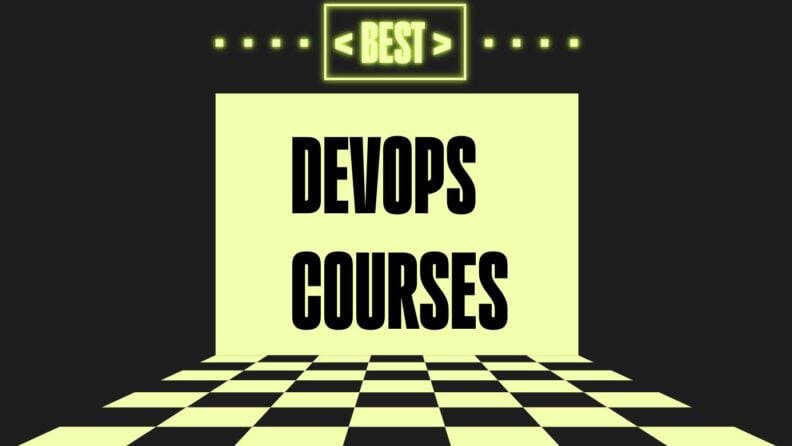DevOps is the driving force behind streamlined software development and efficient IT operations. As the demand for DevOps skills continues to rise, keeping up-to-date with the latest courses is essential for staying competitive.
Whether you're a seasoned engineer or just getting your feet wet, these DevOps courses will equip you with the skills you need to excel in modern software environments. Dive in and find the best fit for your learning journey with our summary of each course.
Best DevOps Courses Shortlist
Here's a shortlist of the best DevOps courses I think are worth your time in 2025:
- Introduction to DevOps (IBM)
- IBM DevOps and Software Engineering Professional Certificate (IBM)
- Preparing for Google Cloud Certification (Google)
- DevOps on AWS Specialization (Amazon Web Services)
- DevOps: Introduction to Developer Operations Specialization (Codio)
- Introduction to DevOps (Great Learning)
- Google Cloud DevOps Fundamentals (Board Infinity)
- Certificate in DevOps (York University)
- DevOps (University of Chicago)
- Introduction to DevOps and Site Reliability Engineering (The Linux Foundation)
- DevOps Culture and Mindset (University of California, Davis)
- Continuous Delivery and DevOps with Azure DevOps (Pluralsight)
- Microsoft Azure DevOps Engineer: Monitoring Code Quality (Pluralsight)
- DevOps Foundations (LinkedIn Learning)
- DevOps Course (IntelliPaat)
- DevOps Foundations: DevSecOps (LinkedIn Learning)
- DevOps Foundations: Lean and Agile (LinkedIn Learning)
- Certified Kubernetes Administrator (CKA) (Linux Foundation)
- Linux: I/O Redirection for DevOps (Coursera)
- Post Graduate Program in DevOps (Caltech CTME and IBM)
Find more details about each course below
Overview Of The Best DevOps Courses
1. Introduction to DevOps (IBM)
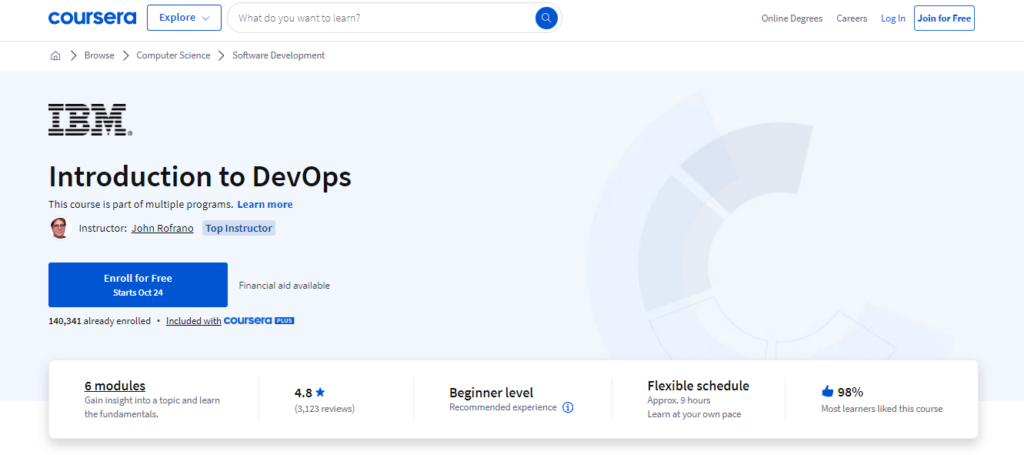
This course covers the core principles of DevOps, focusing on building a culture of shared responsibility and collaboration. It explores key practices like Continuous Integration, Continuous Delivery, and Infrastructure as Code to improve software development and deployment.
- Who It’s For: Beginners interested in learning about DevOps
- Topics Covered:
- Understanding DevOps
- Applying DevOps
- Structuring DevOps
- Evaluating DevOps
- Online, In-Person, or Both? Online
- Exam Required? No
- Duration: 9 hours
- How Many Hours Of Instruction: Self-paced
- Eligibility Requirements: None
- Price: Free
- Take The Course: Coursera
2. IBM DevOps and Software Engineering Professional Certificate (IBM)
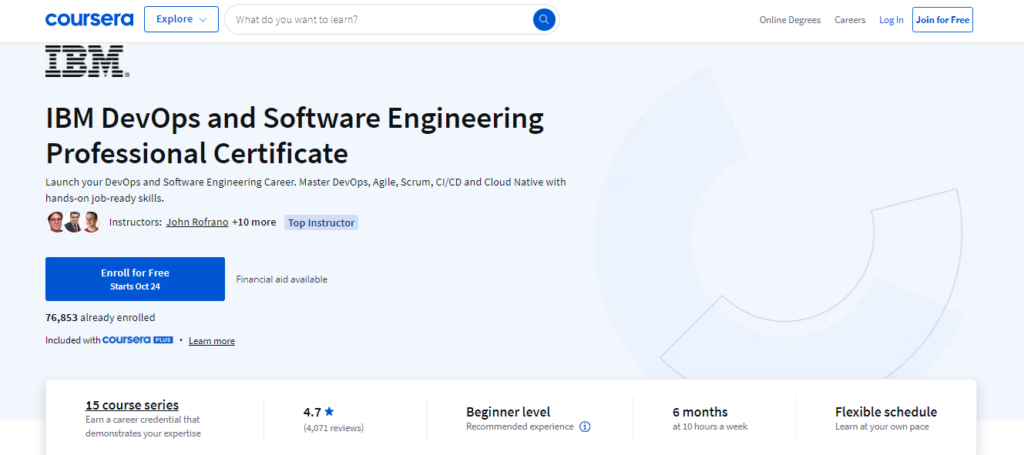
This interactive DevOps training course focuses on developing a DevOps mindset and mastering Agile and Scrum methodologies. Enroll to learn how to create Python-based applications, deploy microservices with containers, and utilize automation tools for continuous integration and deployment.
- Who It’s For: Aspiring DevOps professionals and software engineers
- Topics Covered:
- DevOps fundamentals
- Cloud computing introduction
- Agile development and Scrum methodology
- Software engineering basics
- Git and GitHub usage
- Linux commands and shell scripting
- Python for data science, AI, and development
- AI application development with Python and Flask
- Containers (Docker, Kubernetes, OpenShift)
- Microservices and serverless application development
- Test and behavior-driven development (TDD/BDD)
- Continuous Integration and Continuous Delivery (CI/CD)
- Application security for developers and DevOps professionals
- Monitoring and observability in DevOps
- Online, In-Person, or Both? Online
- Exam Required? Yes
- Duration: 6 months
- How Many Hours Of Instruction: 10 hours a week
- Eligibility Requirements: None
- Price: Free
- Take The Course: Coursera
3. Preparing for Google Cloud Certification (Google)
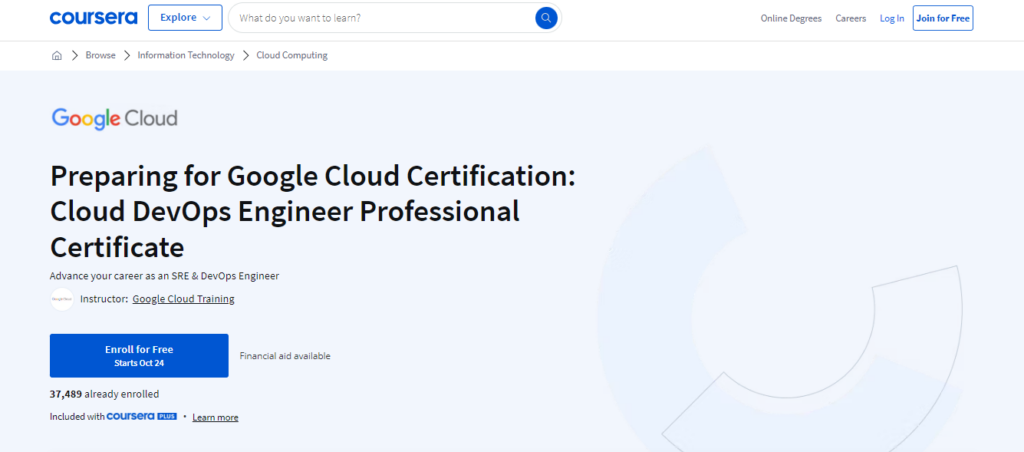
This certified DevOps course provides a comprehensive learning path, covering the essential skills for cloud DevOps engineering. Through focused modules, participants will learn to monitor, troubleshoot, and optimize infrastructure in Google Cloud. The course also prepares participants for the Google Cloud Professional Cloud DevOps Engineer certification exam.
- Who It’s For: IT professionals aiming for Google Cloud certification
- Topics Covered:
- Google Cloud infrastructure fundamentals
- SRE culture development
- Reliable Google Cloud infrastructure design
- Logging and monitoring in Google Cloud
- Introduction to Google Kubernetes Engine (GKE)
- Online, In-Person, or Both? Online
- Exam Required? Yes
- Duration: 1 month
- How Many Hours Of Instruction: 10 hours a week
- Eligibility Requirements:
- Experience with command-line tools
- Familiarity with Linux operating system environments
- Systems operations experience (deploying and managing applications on-premises or in the cloud)
- Basic understanding of scripting
- Price: Free
- Take The Course: Coursera
4. DevOps on AWS Specialization (Amazon Web Services)
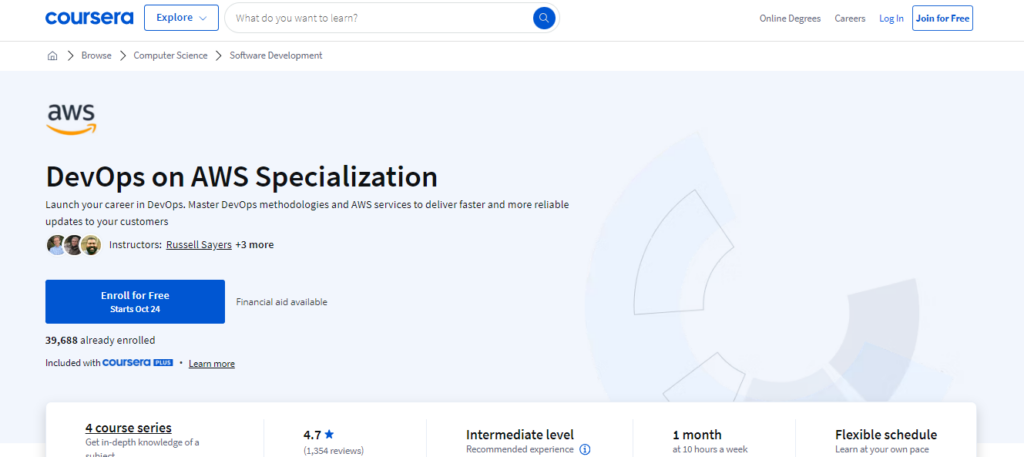
This course focuses on implementing DevOps culture and practices in AWS, emphasizing Continuous Integration and Continuous Deployment. It also explores deployment strategies for serverless applications, opening up new career opportunities in cloud and DevOps engineering.
- Who It’s For: Cloud professionals and developers using AWS
- Topics Covered:
- AWS Cloud technical fundamentals
- DevOps coding, building, and testing
- Release and deployment strategies
- Operating and monitoring applications
- Online, In-Person, or Both? Online
- Exam Required? No
- Duration: 1 month
- How Many Hours Of Instruction: 10 hours a week
- Eligibility Requirements: Basic AWS knowledge
- Price: Free
- Take The Course: Coursera
5. DevOps: Introduction to Developer Operations Specialization (Codio)
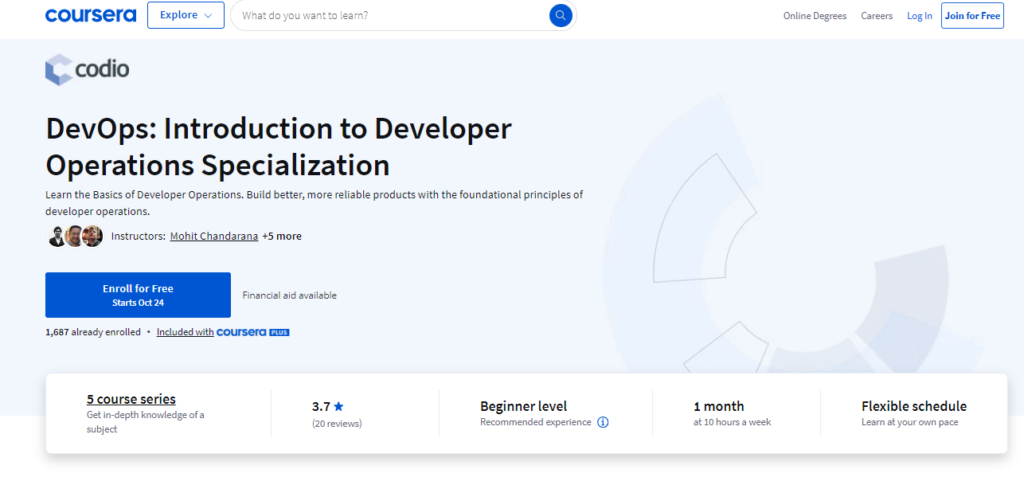
This course covers automating tasks with Ansible, managing containers, and streamlining the software development lifecycle across various cloud platforms. It simplifies the app development process through Continuous Integration and Continuous Deployment (CI/CD).
- Who It’s For: Software developers, IT professionals, and system administrators seeking to enhance their skills in DevOps practices and improve software delivery processes.
- Topics Covered:
- Ansible automation
- CI/CD for software development
- Container creation and orchestration basics
- Introduction to Terraform
- Performance monitoring for application developers
- Online, In-Person, or Both? Online
- Exam Required? No
- Duration: 4 months
- How Many Hours Of Instruction: 10 hours a week
- Eligibility Requirements: None
- Price: Free
- Take The Course: Coursera
6. Introduction to DevOps (Great Learning)
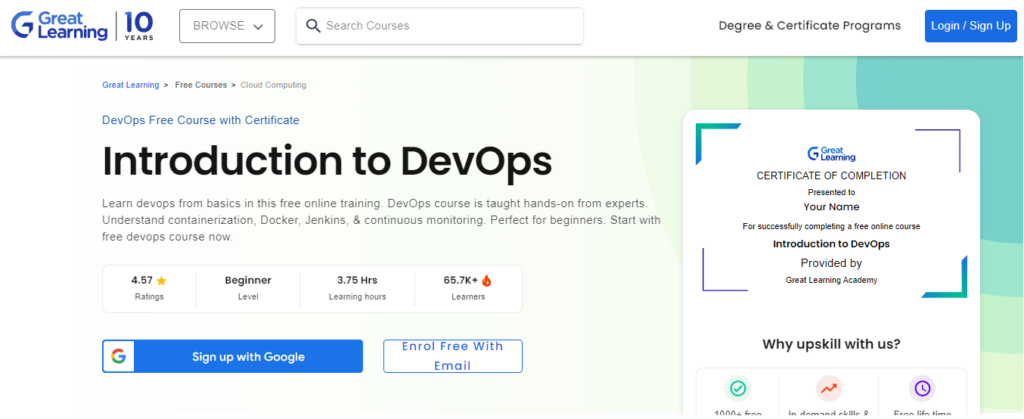
This course introduces the core principles and practices of DevOps, focusing on integrating development and operations teams. It explores improving collaboration and efficiency in software development processes using modern tools and techniques.
- Who It’s For: Individuals interested in learning the basics of DevOps, including beginners, IT professionals, and software developers looking to enhance their understanding of DevOps concepts and practices
- Topics Covered:
- What is DevOps?
- Installing Git
- Common Git Commands
- Installing Docker
- Installing Jenkins
- Online, In-Person, or Both? Online
- Exam Required? No
- Duration: 3.75 hours
- How Many Hours Of Instruction: Self-paced
- Eligibility Requirements: None
- Price: Free
- Take The Course: Great Learning
7. Google Cloud DevOps Fundamentals (Board Infinity)
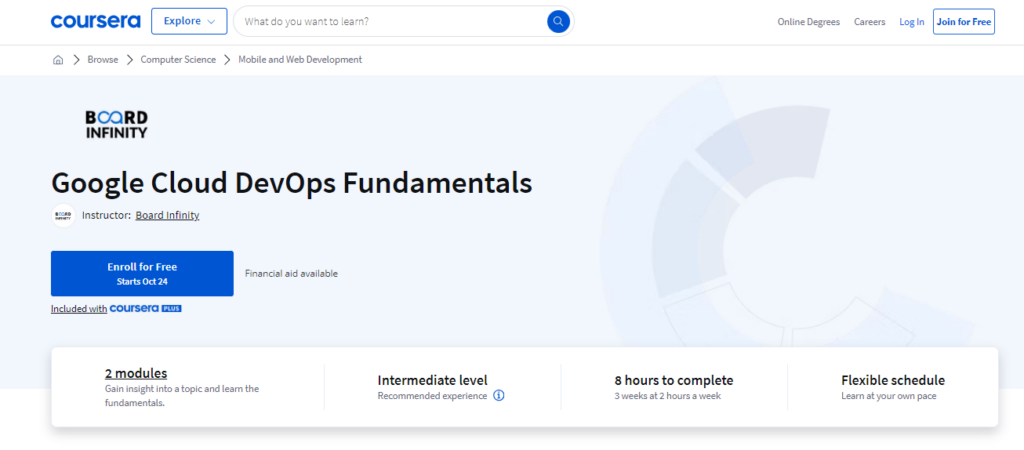
This course teaches how to manage Continuous Integration using Cloud Build and deploy applications with Google Kubernetes Engine (GKE) and Google Cloud Deployment Manager. It focuses on automating and optimizing CI/CD pipelines in Google Cloud environments.
- Who It’s For: IT professionals or developers looking to implement DevOps practices on Google Cloud
- Topics Covered:
- Google Cloud DevOps fundamentals
- Configuring and managing pipelines
- Online, In-Person, or Both? Online
- Exam Required? No
- Duration: 3 weeks
- How Many Hours Of Instruction: 2 hours a week
- Eligibility Requirements: None
- Price: Free
- Take The Course: Coursera
8. Certificate in DevOps (York University)
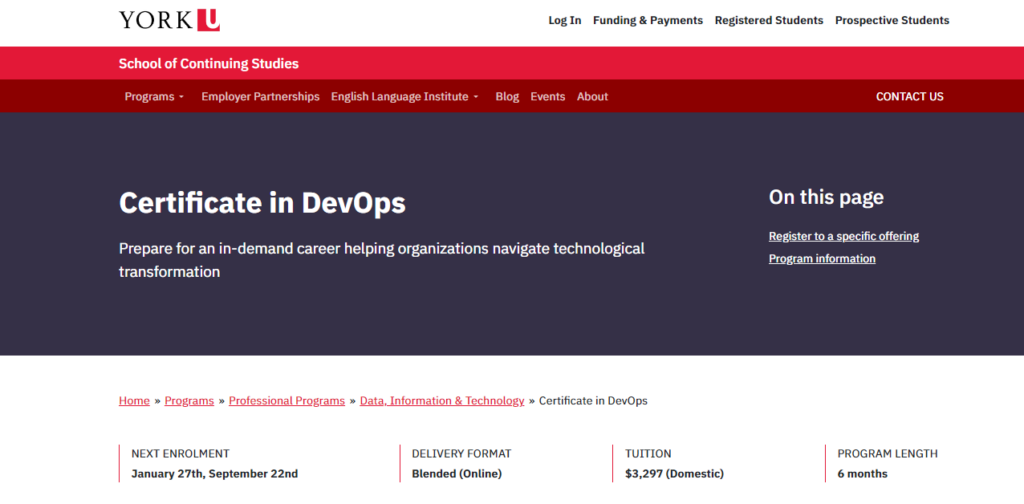
This course teaches how to build and manage DevOps pipelines using tools like Gitlab, Jenkins, Docker, and Kubernetes. It emphasizes integrating software development and IT operations to improve efficiency and streamline application deployment.
- Who It’s For: IT professionals, software developers, infrastructure specialists, test engineers, and database administrators.
- Topics Covered:
- DevOps pipeline creation and management
- Automation using tools like Ansible, Jenkins, and Terraform
- Monitoring with Prometheus and Grafana
- Agile methodologies in DevOps
- DevOps in machine learning and AI contexts
- Online, In-Person, or Both? Online
- Exam Required? No
- Duration: 6 months
- How Many Hours Of Instruction: 36 hours
- Eligibility Requirements: None
- Price: $3,297
- Take The Course: York University
9. DevOps (University of Chicago)
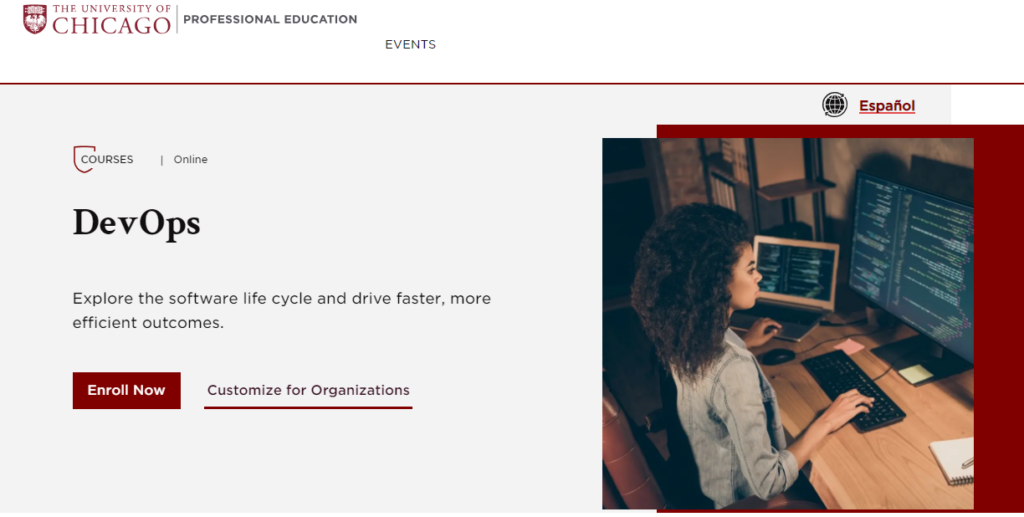
This course teaches how to automate software releases, optimize operating systems, and link software to external libraries. It focuses on building infrastructure for deployment, testing, and monitoring while implementing continuous integration to speed up software delivery.
- Who It’s For: Engineers, technicians, and professionals in technology looking to understand DevOps processes and the software life cycle.
- Topics Covered:
- Introduction to DevOps I – Operating Systems and Virtualization
- Introduction to DevOps II – Scripting, Task Automation, and Cloud Computing
- Development Workflow
- Releasing and File Versioning
- Testing
- Deploying and Packaging
- Configuring
- Monitoring
- Online, In-Person, or Both? Both
- Exam Required? No
- Duration: 8 weeks
- How Many Hours Of Instruction: 5 hours a week
- Eligibility Requirements: None
- Price: $2,800
- Take The Course: University of Chicago
10. Introduction to DevOps and Site Reliability Engineering (The Linux Foundation)
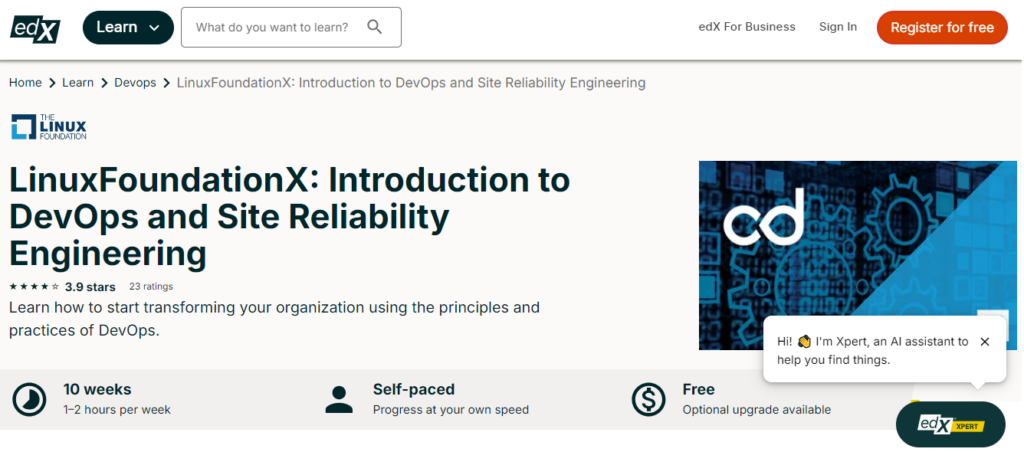
This course covers key DevOps practices, focusing on how they influence software delivery and IT operations. It also explores the impact of cloud computing, container ecosystems, and continuous integration on modern software deployment processes.
- Who It’s For: Professionals interested in learning DevOps and site reliability engineering
- Topics Covered:
- Introduction to DevOps and Site Reliability Engineering:
- Cloud
- Containers
- Infrastructure as Code
- Continuous Integration/Continuous Delivery
- Observability
- Site Reliability Engineering (SRE)
- Online, In-Person, or Both? Online
- Exam Required? No
- Duration: 10 weeks
- How Many Hours Of Instruction: 1–2 hours a week
- Eligibility Requirements: None
- Price: Free with optional upgrade available
- Take The Course: The Linux Foundation
11. DevOps Culture and Mindset (University of California, Davis)
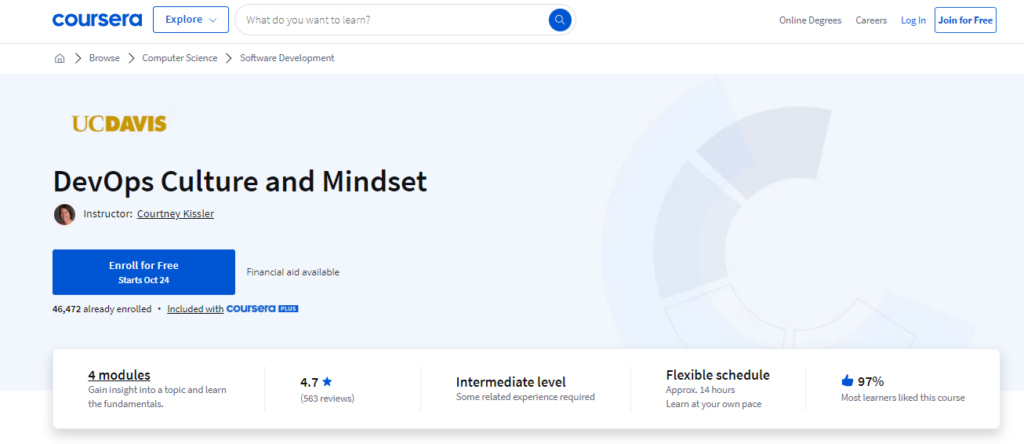
This course teaches how to apply DevOps principles to improve organizational culture and shift focus toward outcomes. It also covers strategies for managing work, improving time to market, and optimizing feedback loops within a DevOps environment.
- Who It’s For: IT professionals, software developers, and team leaders looking to adopt a DevOps culture and improve collaboration, workflow management, and software delivery processes.
- Topics Covered:
- Introducing DevOps concepts
- Adopting a DevOps mindset
- Organizing work within a DevOps framework
- Accelerating time to market with DevOps
- Online, In-Person, or Both? Online
- Exam Required? No
- Duration: 14 hours
- How Many Hours Of Instruction: Self-paced
- Eligibility Requirements: None
- Price: Free
- Take The Course: University of California, Davis
12. Continuous Delivery and DevOps with Azure DevOps (Pluralsight)
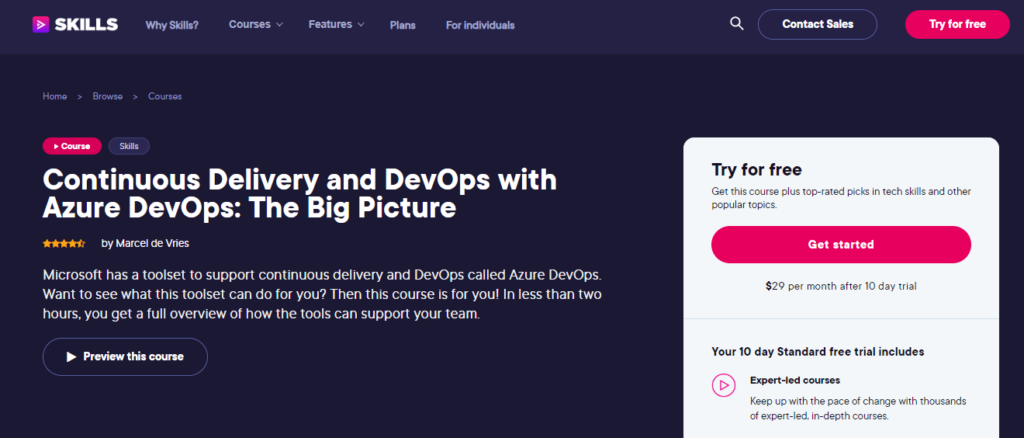
This course teaches how to use Azure DevOps tools to implement continuous delivery, focusing on automating software deployments and maintaining compliance. It covers using boards for agile workflows, Git repos for version control, pipelines for building and deploying software, and artifacts for managing external packages.
- Who It’s For: Developers and IT professionals interested in learning continuous delivery using Azure DevOps
- Topics Covered:
- Understanding Continuous Delivery and DevOps with Azure DevOps
- Online, In-Person, or Both? Online
- Exam Required? No
- Duration: 1 hour and 25 minutes
- How Many Hours Of Instruction: Self-paced
- Eligibility Requirements: None
- Price: $29 per month (after a 10-day trial)
- Take The Course: Pluralsight
13. Microsoft Azure DevOps Engineer: Monitoring Code Quality (Pluralsight)
This course teaches how to integrate code quality checks into Azure DevOps builds, covering static and dynamic analysis and security and performance testing. It focuses on improving application quality by automating these checks in your build pipeline.
- Who It’s For: Engineers, developers, and DevOps professionals looking to improve code quality by integrating automated checks and monitoring into Azure DevOps pipelines.
- Topics Covered:
- Understanding code quality
- Using tools to manage and monitor technical debt
- Implementing security and compliance in the pipeline
- Online, In-Person, or Both? Online
- Exam Required? No
- Duration: 1 hour and 6 minutes
- How Many Hours Of Instruction: Self-paced
- Eligibility Requirements: None
- Price: $29 per month (after a 10-day trial)
- Take The Course: Pluralsight
14. DevOps Foundations (LinkedIn Learning)
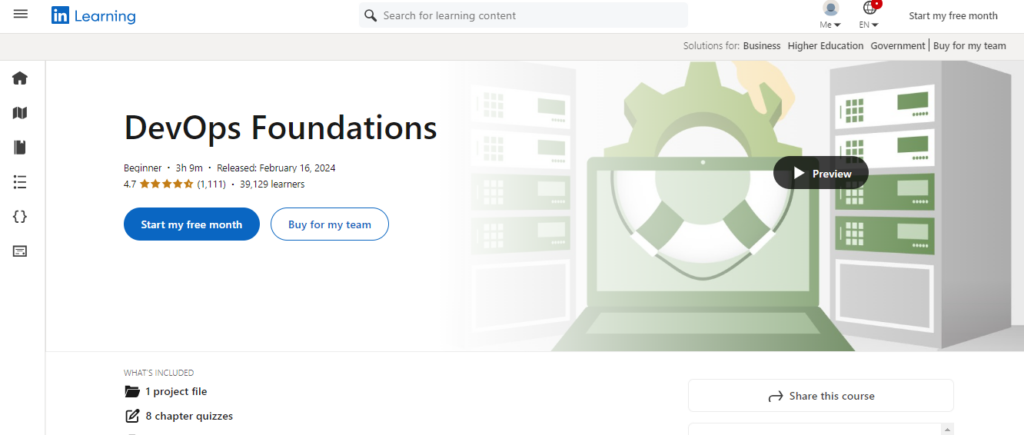
This course explores how DevOps fosters collaboration between software development and IT operations, focusing on automating infrastructure, continuous delivery, and building resilient systems. It also examines how traditional IT practices integrate with DevOps methodologies.
- Who It’s For: IT professionals, developers, and operations teams looking to adopt DevOps practices
- Topics Covered:
- DevOps basics
- DevOps and people: A culture change
- DevOps and process: The building blocks
- Infrastructure as code
- Continuous delivery
- Site reliability engineering
- Online, In-Person, or Both? Online
- Exam Required? No
- Duration: 3 hours and 9 minutes
- How Many Hours Of Instruction: Self-paced
- Eligibility Requirements: None
- Price: LinkedIn Learning subscription ($19.99 billed annually)
- Take The Course: LinkedIn Learning
15. DevOps Course (IntelliPaat)
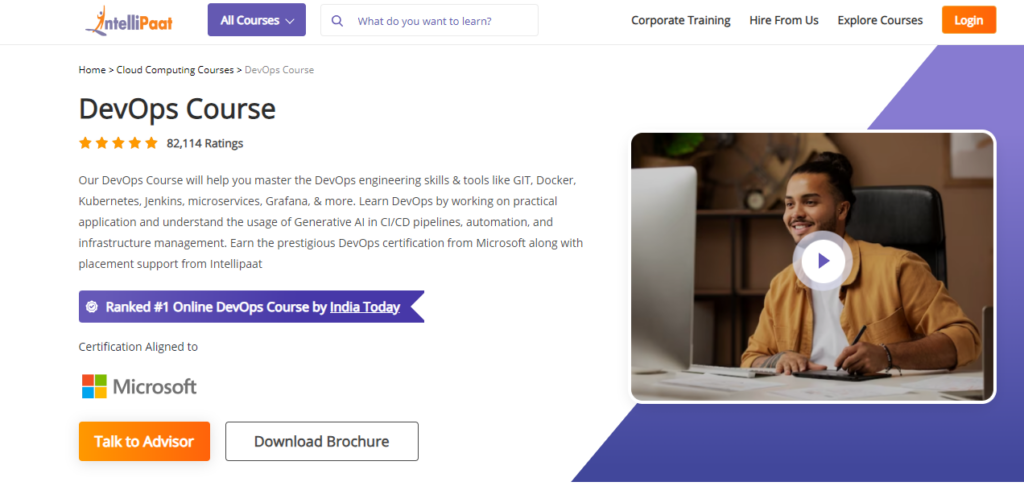
This course provides live, instructor-led training in collaboration with Microsoft. It focuses on hands-on projects and real-world case studies to build DevOps skills. It also includes practical applications of Generative AI tools in the DevOps industry to enhance software delivery and management processes.
- Who It’s For: IT professionals, developers, and engineers looking to gain hands-on experience with DevOps tools and practices to advance their careers in software development and operations.
- Topics Covered:
- Introduction to DevOps
- Version control
- Docker for containerization
- Puppet and Ansible for configuration management
- Selenium for continuous testing
- Jenkins for continuous integration
- Kubernetes for continuous orchestration
- ELK for continuous monitoring
- Terraform and workspaces
- Generative AI in DevOps
- Online, In-Person, or Both? Online
- Exam Required? Yes
- Duration: 40 hours
- How Many Hours Of Instruction: Self-paced
- Eligibility Requirements: None
- Price: $399
- Take The Course: IntelliPaat
16. DevOps Foundations: DevSecOps (LinkedIn Learning)
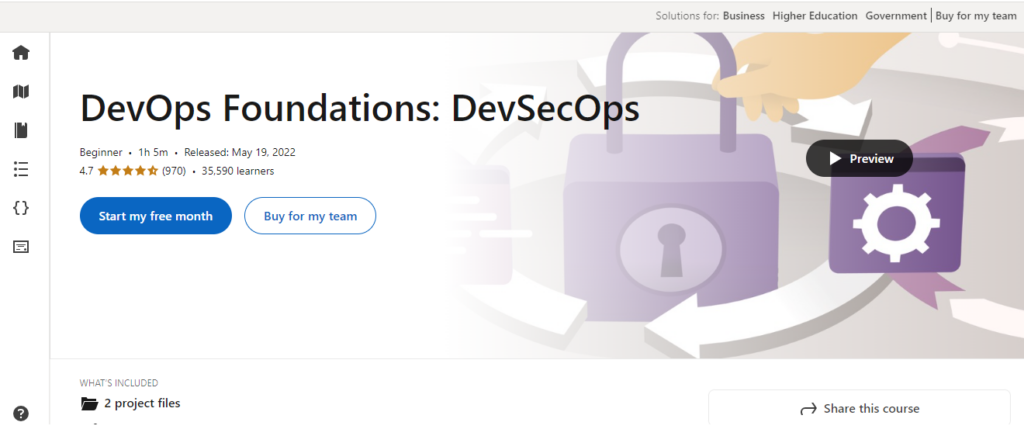
This course introduces the concept of DevSecOps, focusing on how to integrate security into the application development pipeline using automation and continuous testing. It covers strategies for implementing security as code and leveraging tools like APIs and containers to streamline security practices.
- Who It’s For: IT professionals, security engineers, and developers looking to integrate security into their DevOps
- Topics Covered:
- DevOps basics
- Getting started with DevSecOps
- Starting your DevSecOps journey
- Online, In-Person, or Both? Online
- Exam Required? No
- Duration: 1 hour and 5 minutes
- How Many Hours Of Instruction: Self-paced
- Eligibility Requirements: None
- Price: LinkedIn Learning subscription ($19.99 billed annually)
- Take The Course: LinkedIn Learning
17. DevOps Foundations: Lean and Agile (LinkedIn Learning)
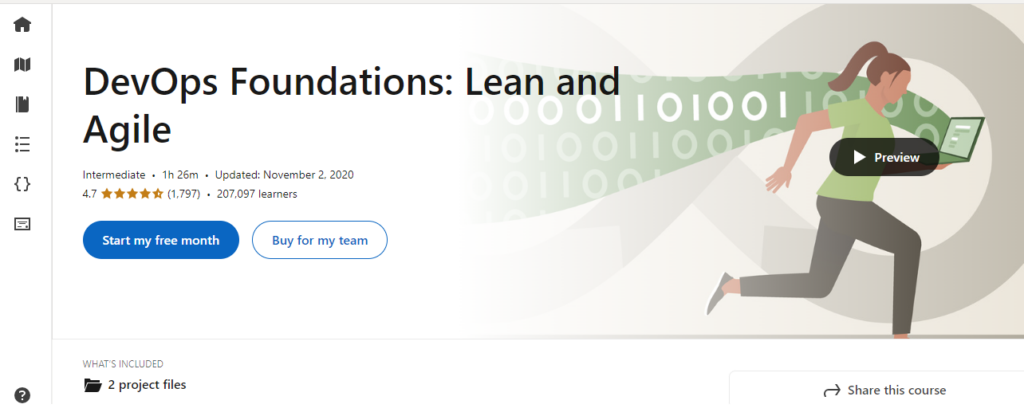
This course teaches how to apply lean and agile principles to improve the flow from development to operations, helping teams accelerate software delivery. It includes practical examples of how these methodologies are implemented in real-world software organizations.
- Who It’s For: IT professionals, developers, and project managers looking to implement Lean and Agile practices in DevOps
- Topics Covered:
- Lean and agile theory
- The story of three cycles
- The path forward
- Online, In-Person, or Both? Online
- Exam Required? No
- Duration: 1 hour and 26 minutes
- How Many Hours Of Instruction: Self-paced
- Eligibility Requirements: None
- Price: LinkedIn Learning subscription ($19.99 billed annually)
- Take The Course: LinkedIn Learning
18. Certified Kubernetes Administrator (CKA) (Linux Foundation)
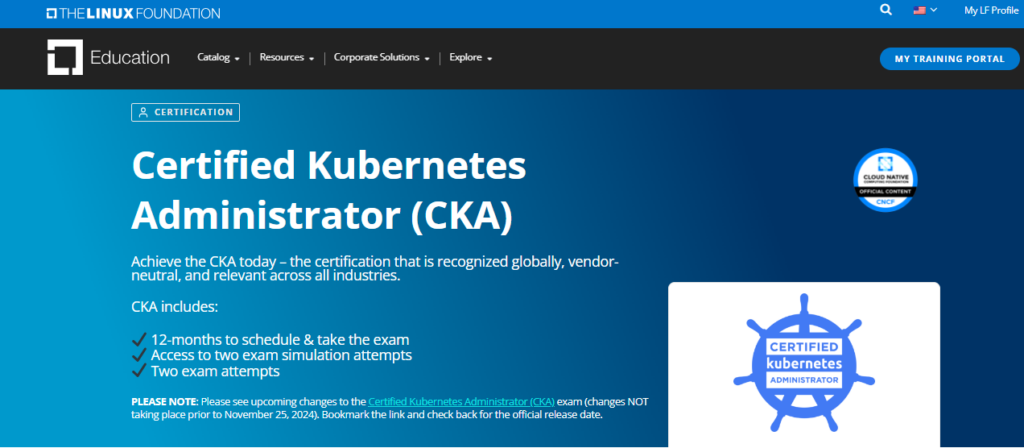
This course helps learners develop skills to administer Kubernetes clusters and pass the online, proctored performance-based exam. It involves hands-on labs where participants solve tasks in a command-line environment running Kubernetes.
- Who It’s For: IT professionals, system administrators, and DevOps engineers who want to demonstrate their expertise in managing Kubernetes clusters.
- Topics Covered:
- Kubernetes architecture
- Installation, configuration, and validation
- Application lifecycle management
- Networking, storage, and security
- Cluster maintenance and troubleshooting
- Logging and monitoring
- Online, In-Person, or Both? Online
- Exam Required? Yes
- Duration: 2 hours
- How Many Hours Of Instruction: Self-paced
- Eligibility Requirements: None
- Price:
- $395 (Exam only)
- $595 (Course + Exam)
- Take The Course: Linux Foundation
19. Linux: I/O Redirection for DevOps (Coursera)
This course focuses on teaching how to use Linux redirection operators to control input and output during command-line operations. Through hands-on practice, it covers how to manipulate data streams and apply redirection effectively in Linux environments.
- Who It’s For: DevOps practitioners, Linux system administrators, developers, and anyone working with or intending to work with Linux
- Topics Covered:
- Fundamentals of I/O redirection: understanding stdin, stdout, and stderr
- Redirecting standard output (stdout)
- Redirecting standard error (stderr)
- Optional practice activity
- Redirecting standard input (stdin)
- Using pipes for advanced redirection
- Optional capstone task
- Online, In-Person, or Both? Online
- Exam Required? No
- Duration: 2 hours
- How Many Hours Of Instruction: Self-paced
- Eligibility Requirements:
- Linux navigation and basic commands (cd, .., mkdir, cat, touch, rm, cp, mv)
- File manipulation commands (find, grep, cat)
- Price: Free
- Take The Course: Coursera
20. Post Graduate Program in DevOps (Caltech CTME and IBM)
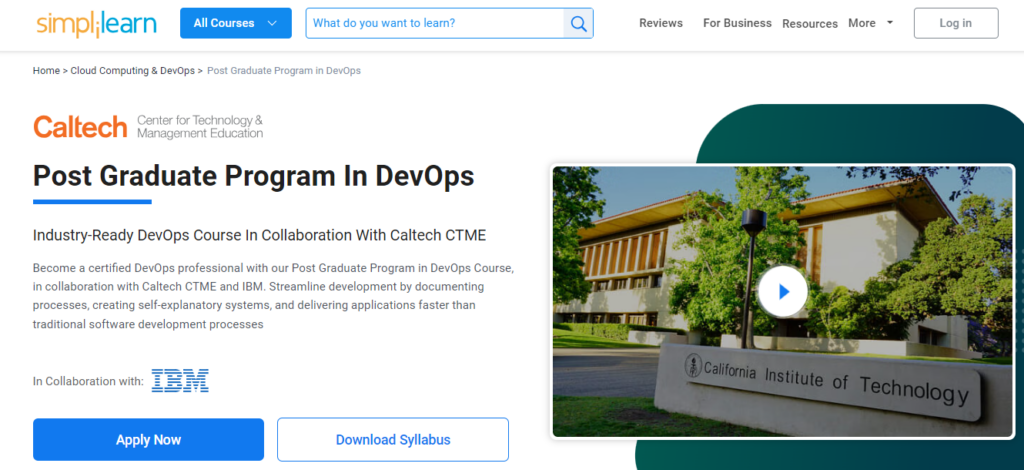
This program provides comprehensive training in DevOps practices, tools, and techniques, developed in collaboration with Caltech CTME and IBM. It combines practical learning with real-world projects to help learners gain skills for implementing automation and DevOps pipelines in enterprise environments.
- Who It’s For: Professionals looking to advance their DevOps expertise and career
- Topics Covered:
- Foundations of DevOps – Version Control and CI/CD with Jenkins
- Configuration Management using Ansible and Terraform
- Docker Containerization
- Kubernetes for Container Orchestration
- Monitoring and Logging in DevOps
- DevOps on AWS
- DevSecOps – AWS Cloud Security and Principles
- Serverless Architecture in DevOps
- DevOps Capstone Project
- Online, In-Person, or Both? Online
- Exam Required? Yes
- Duration: 9 months
- How Many Hours Of Instruction: Self-paced
- Eligibility Requirements:
- One year of prior work experience (preferred but not required)
- A bachelor's degree with a minimum of 50% or higher marks
- Open to candidates from both programming and non-programming backgrounds
- Take The Course: Simplilearn
Join For More Insights
With DevOps continuing to transform how organizations build and deploy software, investing in your skills has never been more crucial. The courses we've highlighted will help you deepen your understanding and become invaluable to your team. Choose the one that aligns with your goals, and get ready to thrive in the evolving world of DevOps.
Boost your SaaS growth and leadership skills. Subscribe to our newsletter for the latest insights from CTOs and aspiring tech leaders. We'll help you scale smarter and lead stronger with guides, resources, and strategies from top experts!

